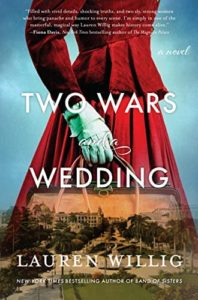 Lauren Willig’s new novel blooms from one of her recent books, Band of Sisters (2021) which followed a group of Smith College grads as they made their intrepid way to France to lend a hand during WWI in 1917. Willig became intrigued with their leader and this book’s central character is based on her – another Smith grad who trained in archeology, was denied “dig” time in Greece because of her sex, and turned to humanitarian work and war nursing.
Lauren Willig’s new novel blooms from one of her recent books, Band of Sisters (2021) which followed a group of Smith College grads as they made their intrepid way to France to lend a hand during WWI in 1917. Willig became intrigued with their leader and this book’s central character is based on her – another Smith grad who trained in archeology, was denied “dig” time in Greece because of her sex, and turned to humanitarian work and war nursing.
Willig’s fictional creation, Betsy Hayes, has just arrived in Athens in 1896 hoping to excavate. The classicist in charge tells her to try being a librarian; she finds lodging with a swanky titled Greek woman who knew her father, gets around town on her bicycle, and manages to get on some archaeological tours with the male students. Along the way she encounters a dashing French Count and falls hard even though (gasp, though not a surprise) he’s inconveniently married. Ultimately, her frustrations become so great she decides to try war nursing. Recommended by the Queen of Greece, she heads to the front, in what was the short lived Greco-Turkish war of 1897. Short lived, but with no shortage of horror.
Betsy ends up running a small hospital, working about 24 hours a day, and seeing scores of wounded men, some of whom she can’t help. Willig has structured the book so it goes back and forth in time, and slightly in the future, she’s serving as a nurse during the Spanish-American war in Cuba, on the heels of Teddy Roosevelt’s Rough Riders. This is not a mystery but there is a mystery in the plot – why is Betsy in Florida, headed to Cuba? Why didn’t she stay in Greece? The book spools out the answers but it takes until near the end for the reader to put the pieces together.
The war in Cuba seems almost worse, though there are certainly commonalities. Betsy is more confident in her nursing skills, and she needs them, as the US Military are no more enlightened than Classics professors when it comes to women on the field of battle. Clara Barton is leading the charge and she’s refused by the US military, so she sets up shop with the Cubans. Necessity eventually finds its way as the battle intensifies, however, and it’s not long before Betsy is tending to some of the Yale boys she’d known in college.
While Willig has based her character on a real woman, she’s a powerful writer and a wonderful portraitist, so much so that Betsy Hayes practically leaps off the page and into your soul. She’s so alive. When Betsy eventually heads home from Cuba it’s on a ship that’s not at all equipped for any kind of medical transport, and the patients they are transporting are stuffed into hellishly hot cubicles below decks. It’s Betsy who is able to organize and drag the men back to the states, alive, and to actual medical care, and if you aren’t practically cheering for her when she disembarks in New York, there’s something the matter with you.
This is a true epic, and there’s of course also a romance involved (see the title). As the ultimate love of Betsy’s is not at all obvious, I won’t give things away, but will let the lucky reader discover for themselves where Betsy’s heart ultimately takes her. There’s a nice historical afterword (my knowledge of the Spanish American war was very small), and it’s fun to see how Willig wove history into fictional gold. This is a spectacular read. — Robin Agnew